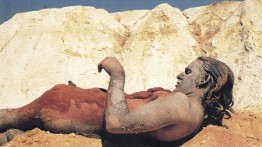Fall 2013 Seminar Series: Charles Simonds
Tuesday, November 12, 2013, 12 - 2pm
Landscape<-->Body<-->Dwelling
Charles Simonds
Since the beginning of the 1970s, New York–based artist Charles Simonds (American, b. 1945) has developed a unique practice at the intersection of sculpture, performance, street art, activism, and utopian city planning. Addressing the condition of being human through its fundamental relation to Earth and the built environment, Simonds’s work is an inquiry into building as a way of thinking and architecture as an indicator of who we are. As a young man, Simonds built miniature "dwellings" in gutters and crevasses of buildings in Manhattan’s Lower East Side—habitats for the Little People, an imaginary population whose history, sociology, and beliefs Simonds documented in films and writing. In addition to footage of these dwellings, films of rituals enacted by the artist, at the core of the artist’s mythology, will be screened, followed by a presentation by Simonds of his practice at large. Text: Stephanie Weber, New York
Located in room 315F at 2pm





